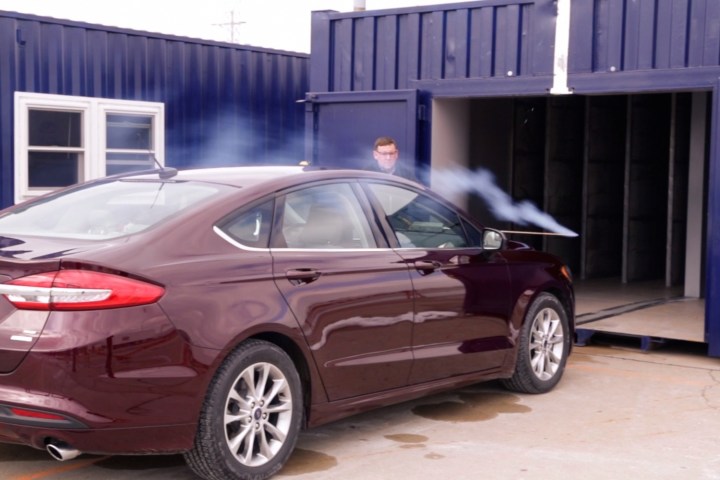
Ford is changing that, though. The carmaker figured out how to build a mobile wind tunnel out of shipping containers that can operate at a fraction of the cost of a conventional setup. It was built specifically to test for unwanted wind noise in early-production vehicles. The cars are pulled off the assembly line and tested onsite, which Ford hopes will shorten the amount of time needed to identify problems and implement fixes.
Compared to Ford’s main wind tunnel in Allen Park, Michigan, which is the size of an office building and cost $50 million to build, the mobile wind tunnel is a bit more primitive. It consists of two 53-foot-long shipping containers that can be trucked wherever they’re needed. Two six-foot-diameter fans powered by 250-horsepower electric motors can generate winds of up to 80 mph.
Read more: How Ford plans to take its Michigan headquarters into the future
The two containers are fastened together side by side on a flat section of pavement. A third, 40-foot container serves as an officer and control booth. Despite using 100-foot power-distribution cables that weigh 1,080 pounds each (including 40-pound plugs), Ford says the entire assembly can be broken down within a day, and reassembled at a new site “within hours.”
In-car sensors, like a noise-detecting dummy called an “Aachen head,” are used to check newly-assembled vehicles for issues. Doing that work at a factory eliminates the need to ship cars across the country to traditional facilities, and allows for quicker fixes since all of the relevant people are in one place, Ford says. The mobile wind tunnel also frees up Ford’s Allen Park tunnel for more in-depth work, like new-vehicle development.
The mobile wind tunnel will be put into operation at Ford’s Flat Rock Assembly Plant in Michigan, which builds the Mustang and Fusion. Ford has other mobile test facilities as well, including three environmental evaluation chambers.
Editors' Recommendations
- Ford recalls over half a million vehicles over safety issues
- 2022 Ford F-150 Lightning: America’s bestselling vehicle goes electric
- Watch NASA test the propellers of its all-electric X-57 plane in a wind tunnel
- Ford recalls 230,000 vehicles over suspension issue that could cause a crash
- Ford vehicles will get over-the-air software updates beginning in 2020


